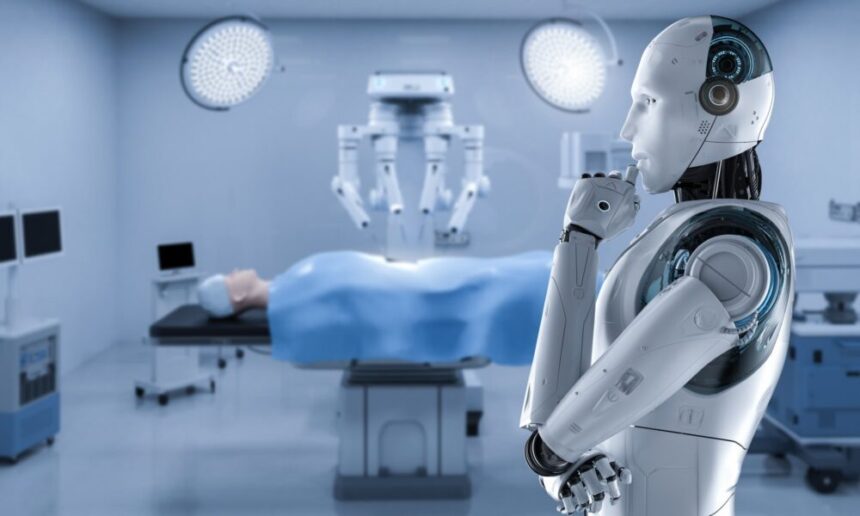The mixing of synthetic intelligence (AI) into healthcare has been transformative, significantly within the subject of robotic-assisted surgical procedures. This technological fusion guarantees to reinforce surgical precision and enhance affected person security and outcomes considerably. On this weblog, we are going to discover the assorted methods AI is revolutionizing robotic-assisted surgical procedures, inspecting its influence by means of a number of key views.
The Evolution of Robotic Surgical procedure:
Robotic-assisted surgical procedure has come a great distance since its inception, marked by vital developments which have reworked surgical practices. Understanding this evolution supplies context for the position AI performs in present surgical procedures.
Introduction of AI:
The introduction of AI into robotic surgical procedure marks a brand new period. AI algorithms improve the capabilities of robotic programs by offering real-time information evaluation, predictive analytics, and automatic help, which considerably enhance the accuracy and security of surgical procedures.
Actual-Time Information Processing:
“AI algorithms course of huge quantities of information in real-time, offering surgeons with vital data throughout procedures. This contains analyzing patient-specific information, surgical developments, and intraoperative metrics to information surgical selections and enhance accuracy”. Says, Sam Arthur, Head of Advertising and marketing at Our PCB
Predictive Analytics:
Predictive analytics, powered by AI, anticipate potential problems and recommend optimum surgical paths. By analyzing historic information and present affected person data, AI can predict the most effective plan of action, decreasing the chance of errors and enhancing surgical precision.
Enhancing Security in Robotic-Assisted Surgical procedures:
Past precision, AI considerably enhances the security of robotic-assisted surgical procedures. This part explores how AI contributes to safer surgical environments and outcomes.
Minimizing Human Error:
By offering data-driven insights and automatic help, AI reduces the reliance on human judgment alone. This diminishes the chance of human error, which is a major consider surgical problems.
Adaptive Studying:
AI programs are able to studying from every process, repeatedly bettering their algorithms based mostly on new information. This adaptive studying signifies that every surgical procedure advantages from the collective expertise of earlier procedures, resulting in incremental enhancements in security and effectivity.
AI-Pushed Surgical Coaching and Simulation:
AI’s influence on robotic-assisted surgical procedures extends past the working room to the coaching and schooling of surgeons. This part examines how AI-driven coaching and simulation are reworking surgical schooling.
Digital Actuality Simulations:
AI-powered digital actuality (VR) simulations present immersive coaching environments the place surgeons can apply procedures with none threat to sufferers. These simulations replicate real-life eventualities, providing hands-on expertise with advanced surgical procedures.
Personalised Coaching Packages:
“AI analyzes the efficiency of particular person surgeons throughout coaching, figuring out strengths and areas for enchancment. Primarily based on this information, AI can tailor coaching packages to deal with particular wants, making certain that surgeons are well-prepared for precise procedures”. Says, Jamie Frew CEO, of Carepatron
Affected person-Particular Surgical Planning:
AI permits extremely personalised surgical planning, which is vital for attaining optimum outcomes. This part explores how AI contributes to patient-specific surgical methods.
Preoperative Planning:
“AI algorithms analyze affected person information, together with medical historical past, imaging outcomes, and genetic data, to develop detailed preoperative plans. These plans are tailor-made to the distinctive anatomy and well being circumstances of every affected person, making certain precision and security throughout surgical procedure”. Says, Martin Orefice, CEO of Lease to Personal Labs.
Personalized Implants and Prosthetics:
“AI assists in designing personalized implants and prosthetics that completely match the affected person’s anatomy. This customization reduces the chance of postoperative problems and improves the general success of the surgical procedure”. Says, Gen Yan, Founding father of HoneyChat
Future Prospects and Moral Concerns:
As AI continues to evolve, its position in robotic-assisted surgical procedures is predicted to increase even additional. This part discusses the longer term prospects of AI on this subject and the moral issues that include it.
Rising Applied sciences:
“Future developments in AI know-how promise even better precision and security in robotic-assisted surgical procedures. Developments corresponding to machine studying, deep studying, and superior robotics will doubtless result in extra autonomous surgical programs that may carry out advanced procedures with minimal human intervention”. Says, Makenna Francsis, PMHNP at American TMS
Moral Concerns:
The rising position of AI in surgical procedure raises necessary moral questions, together with problems with accountability, affected person consent, and information privateness. It’s essential to ascertain clear moral pointers and regulatory frameworks to make sure that AI is used responsibly and transparently in healthcare”. Says, Kartik, Advertising and marketing Supervisor, portaparty
Integration into Healthcare Techniques:
For AI to attain its full potential in robotic-assisted surgical procedures, it should be seamlessly built-in into current healthcare programs. This integration entails collaboration between technologists, healthcare suppliers, and policymakers to create a supportive setting for AI-driven improvements.
Conclusion:
The mixing of AI into robotic-assisted surgical procedures represents a major leap ahead within the subject of healthcare. By enhancing precision, bettering security, revolutionizing surgical coaching, enabling personalised surgical planning, and paving the way in which for future developments, AI is reworking the panorama of surgical practices. As we proceed to embrace these technological improvements, it’s important to deal with the related moral issues and make sure that AI is used to its fullest potential in enhancing affected person care. The way forward for robotic-assisted surgical procedure, powered by AI, holds nice promise for attaining unprecedented ranges of accuracy, security, and affected person outcomes.









